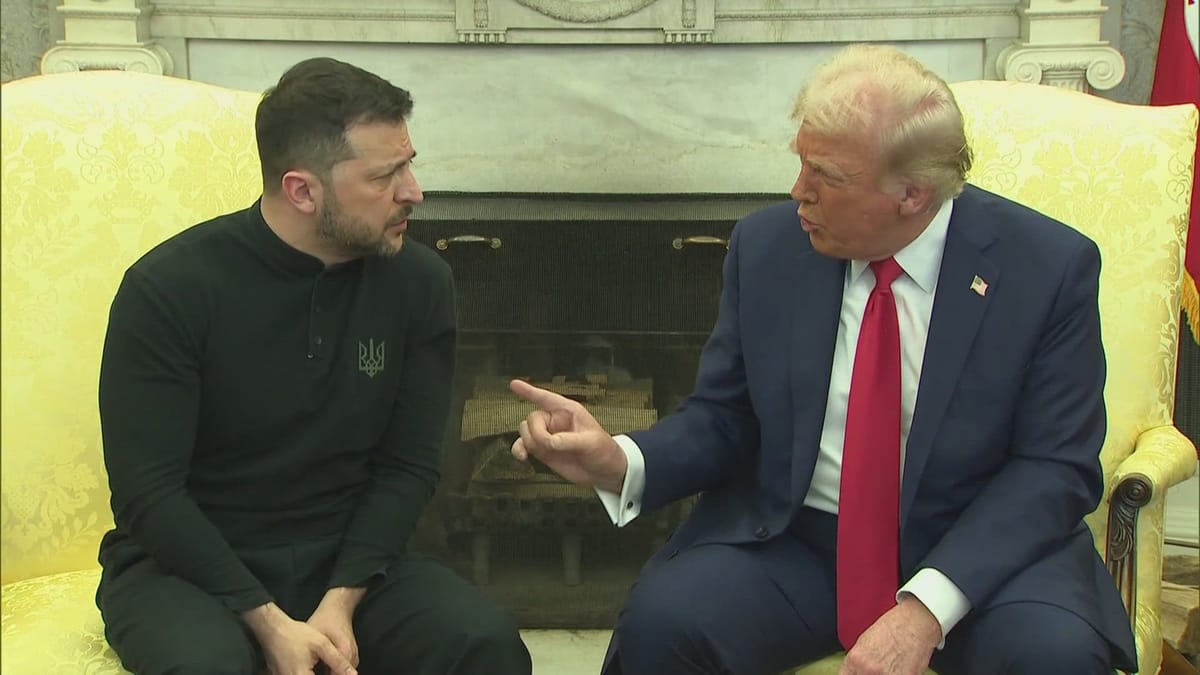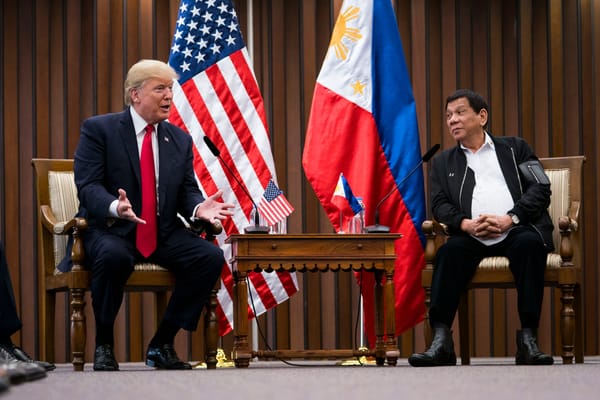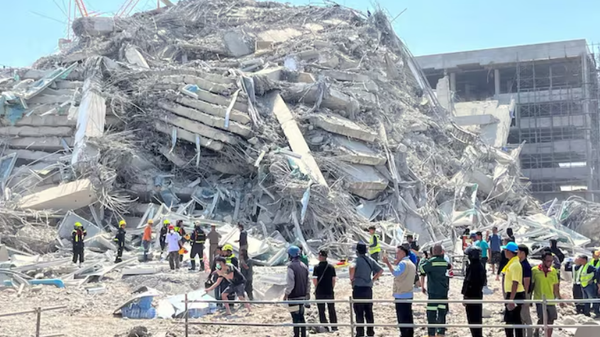More Courage needed in the Global Crisis of Democracy, and America's Free Fall

American resignment turned a free fall
With a flurry of events in the first two months of 2025, it is both perplexing and tricky to answer whether we are living in better or worse world. The attempt for characterisation of global trends and tendencies are tempting, yet proves to be difficult in the face of disruptive changes and great uncertainties. We now know we would not have an anchor to be moored around in the disruptive world, because we are standing in the middle of the running waves, but at least we need a compass to navigate, or a sense of hope for continued progress in such global political context. In short, we need a prescription of what we are facing and how to fix it.
The world has been getting dramatised in the first months of 2025, and it reached another climax in the fiery 10 minutes between Trump/Vance and Zelensky, which brought any remnants of hope for the continuity of the democratic alliance led by the States down the drains. But it is unimaginable in a sense that there have been expectations that America will resign from the world's leadership, and we all know America is not back, and America is not leading again as former president Biden promised; a scenario of America voting with Russia, Belarus in the UN, and posing threats to global democracy caught us off guard.
My colleagues who specialise in earth science are so keen on the debate with me about geopolitics, they questioned "we've collected data and information about the Earth. We try to understand the shape, morphologies, hydrology, meteorology of the earth. And the degree of diversity, plurality, and multifaceted geographies and climates of our World often takes us by surprise. How come the climate of world's geopolitics is only the climate of American politics?". But this question makes sense, with a world of naturally being diverse, and pluralistic in shapes and populations, the center of power will gravitate gradually from Washington towards different "poles", and we all know our global geopolitics mispresents the nature of our Earth. Such mispresentation must end. But let's make no mistake, we expect this gravitation to be gradual and "safe", and what we are seeing now is a free fall with untold consequences, damage and collapses, and the pinch has been felt in Europe and our democratic allies.
Much as we expect someone to step in and replace American leadership, it seems that no global power is ready to step in and fill in this gap. Britain's Keir Starmer called for a security summit on Ukraine in a bid to revive hope, and Canada's outgoing Prime Minister Justin Trudeau are off to Europe for attendance, highlighting what to be urgently dealt with needs non-European stakeholders to be involved with. It could be a turning moment if consensus is reached to accelerate the rearmament of European nations for defense against the Russia's invasion. However, things might turn bitterly disappointing if the summit ends with countries; imbued by their short-term national interests, and desire the keep their national spending in balance refuse to go out of their way, despite the acute threats on the frontline. We are appalled by America's wreckage, but equally put off by the sluggish change from European side, and obviously whether European nations, and non-American democracies could re-arm and step in to lead will decide the world we will see next years and decades.
The world is getting multilateral as a matter of facts, with the emergence of international blocs and forums; treaties and agreements as the global issues are getting more complex which necessitate the demands that complex problems requiring transboundary solutions should be discussed and sought out globally, from trade, climate change, human rights, or security. Multilateralism first appeared as top-ups to the America-centric order, in a way everything could be debated and spoken, but no deal would be achieved without America whether they are in or out of these forums. In other words, multilateralism is a necessity, but not of self-sufficiency.
Let's take Paris Agreement on Climate Change, for example. The scientists warned in the early days of Trump's second terms that the agreement would be basically functionless without America membership. Climate change is one, now the future of Ukraine is another. Much as we expected America to be a multilateral player who are engaged with multilateral institutions to lead the opinions and resolutions, and provide backing for certain resolutions with its sheer economic and military influence, it is not the case as a matter of facts. America has actually been walking on their old track, in which things are discussed behind the closed doors among few people, or made unilaterally and pushed recklessly on the table; you can either agree or disagree, but you have to fall in line; you can only adapt American resolutions for the world rather than trying to challenge it. The allies have gritted their teeth and fall in line until this unilateralism is too disastrous and far beyond any imagination. For those who linger on American leadership, there are some certain points to put in mind.
First, America could not lead because their refusal to get engaged and lead the resolutions in multilateralism, and their temptations to unilaterally dictate, this kind of leadership is no longer fit for the nature and geopolitical representation for the world we are in today. But the second reason, which seems more imperative and realistic to say is America simply can't lead the democratic world anymore if they voted with Russia, North Korea, and Belarus. Whether we want or not, whether we linger, this resignment is now to be seen. On the other hand, this free fall of America will tarnish their reputation and relationship with their allies, and take years or even a decade to repair; with a president who has confusions between domestic politics and foreign affairs, going on a full-scale attacks on his predecessor Joe Biden, and bring up their national interests in the talks about military aids and support for Ukraine; not being able to differentiate between friends and foes.
America is not only resigning, they are seen a threat for democratic allies now. Of course we are tempted to say nothing will be reached without the inclusion of America on the table; but any hope that American politicians will manage to tame Donald Trump and bring back a sense of normalcy is also false hope. Unlike in 2016 when the Republican Party managed to bring in the White House at least some officials some experience and give the president a check in his exercise of power, Trump 2.0 administration is packed with unqualified people and unelected Elon Musk; and totally unchecked in that the Republican Party only sit by and cow out to Donald Trump with fear and anxiety from him potential retaliation, and are so quick to adapt to Donald Trump's assaults on democratic institutions and inclinations to rule by decree. Trump's America get a free hand to wage trade wars with their own friends and allies. As American democracy is in crisis institutionally and constitutionally, American leadership on global issues is totally out of question. What we are seeing not American resignment on the expected course, it is a free fall. And in this regard, we realise in a normal world, nothing is possible without America stepping in, but now that America is not stepping, and we need to go out of our way in an abnormal world.
Democracies need to be on the offensive
And it is vitally important to understand the implications and consequences of American resignment. The most imminent implication it has is on the war with Ukraine. Without the access to the world's biggest arsenal, Ukraine is stripped of their own means to fight the war. If Europe fails to offset this support we once took for granted, Russia will advance and get a free hand to murder Ukrainian civilians. With the rise of populism in Western Europe, and populist grips on to power in Eastern Europe, our democracies could fail once the frontline bastion is captured. European politicians long fear that their step-up on defenses and more support to Ukraine would increase debts, and cost them seats in the general elections, also cause ruptures of the generous wealth fare of the ageing population in Europe, and who's ready to give that up and want austerities. But the wealth of Europe dwells on lasting peace and security after World War 2. Surrender to the reality is also not an option, pinning hope on America's continued role as a security provider is also not. Europe needs to re-arm themselves. Now Europe have no choice; sitting passively in the defensive is not even an option, and they need to make advances. The same also holds true for Japan, South Korea, and Taiwan; which could fall victim to America's pull-outs if they do not act fast. They need to act and act fast to move from being defensive to be on the offensive in protection of democracy.
Germany should re-arm for sure, Britain commit to increase the national defense budget to 2.5% of GDP at the expense of foreign aid cuts. But 2.5% might not be enough with Poland's commitment to leverage the military spending at 5% of GDP; the bar of major European powers' spending on defense must be risen to 5% or even 7.5% even at the cost of borrowing.
EC's president von der Leyen has quite recently played Ronald Raegan's language "peace through strength". It reminds us of historical speed "A time for choosing" by Ronald Reagan, in which he convinced Americans and allies that we must not choose to surrender for peace to be guaranteed. The speech was monumental for calling democracy to advance, and finally led to the downfall of the Soviets and communist states in 1989 and early 90s. Yet to be seen is von der Leyen's "peace through strength" will resonate with the minds of world's democratic leaders.
Nature of this global democracy crisis
And as it stands now, Atlantic alliance is dead, and NATO is in critical paralysis, and possibly the damage has been beyond repair. As the most reliable, strongest and most romantic democratic alliance is gone, the survival of global democracy will rely more on the democratisation and structural reforms of our international institutions and mechanisms, and stronger enforcement of international laws, we might fail if our international institutions and laws remain toothless. We saw the great threats from Russian aggression, but the small acts of human rights abuses and violations committed by smaller national actors should be seen as risks to global democracy as well, and we need devices and mechanisms to hold these to account.
Despite Russian invasion of Ukraine, I still believe that authoritarian states are not direct risks (or causational to the current crisis) to the democratic world as democracy is weighed 2/3 of the world, making it majority even in the world of disruptions and uncertainty. Neither is China or North Korea can revert the dominance of global democracy. Global democracy, though, is failing on its own terms, having been entangled in internal crisis, inability to swiftly reform, failure to swiftly respond to and filter out populism and "illiberalism". It is largely owing to having a generation of politicians who lack courage, act and think normal (or by "standard") in an abnormal world, who wishes to manage and regulate the issues in a risk-mitigation, and damage-avoidance mindset (stylizing the financial management) rather than political craftmanship.
It is urgently needed to prevent a Russian military victory, and in the long term provide stability and security for global democracies. Starting from 2020, we saw widespread democratic setbacks globally, demonstrated by the decrease in the Global Democracy Index. It happened with a military coup in Myanmar in 2021. The same year registered American disastrous pull-out of Afghanistan, and Taliban taking over the country; and Azerbaijan and Armenia's crisis; and the following years saw the conflicts breaking out between Israel and Palestinians (Arabian world if speaking largely). Democracy can be failing in the absence of external threats by not living up to its essence and values. I'd argue that while democratic values are not being challenged by authoritarianism in terms of ideologies or a strain of authoritarianism emerge as more superior to democracy, we are falling short of the capability to provide defense and security to ensure peace and stability for the world of democracies and over-reliant on America. We saw America on the retreat at least in 2016, and we knew this situation coming, but we decided not to do anything about it. We are also short of the mechanisms and enforcements to resolve the conflicts and hold human right abuses to account. Every time, the crisis breaks out, our politicians either pay a lip service or sit on the comfort that at least it is happening on the fringe, or at least it is not taking place at the center of the democracy world. This bubble-wrapping mindset makes democracy in the defensive at the time we are able to advance, and it is not a crisis of democratic values owing to the omnipresent presence of authoritarian forces, a crisis of failing non courage, strategies and action is more precise way to call the crisis.
Outlooks on democracisation in Indo Pacific Region
How American retreat will affect democracy prospects and the forging of the democratic alliance in the Indo Pacific region. It would be lengthy to discuss the possibilities and opportunities of democratisation of Indo Pacific region and it would necessarily involve China in this discussion. But to be fair, China is also on the retreat after the bankruptcy of their BRI and is more inward looking rather than trying to be an influencer in the Region. And while it should be a topic for another article, the attempt to obstruct democratisation and failure to embrace democracy is also met with consequences, as we witnessed the socio-political crisis in the authoritarian countries such as Myanmar; and Laos and Cambodia (with one at civil wars, and the others anguished in instability and economic crisis). In a region featured by free trade, and exchanges, democratisation and institutional reforms are associated with the capabilities of nations to maintain peace, prosperity, competitiveness, and integration with the regional and international institutions and access to regional and international cooperation. And no national actors, big or small, would be able to flout the international rule of law. To be hosted in the Indo Pacific House, nation-states must be proactive, law-abiding actors while focusing on institutional reforms and democratic improvement to remain competitive and relevant.
And currently, we see the democratisation kickstarted in Bangladesh, which came just as a starry hope amid the gloomy night. The regimes in Thailand, the Philippines, and Indonesia remain to be hybrid states; which adopt democracy in their governance, but to a certain extent scandalous, and not striding towards greater reforms. We also count on the capabilities of these countries' civil societies and governments to continue the process of democratisation.
Little attention paid to Vietnam, my country; ambushed in internal crisis with the Party leaders trying on phoney reforms to do away with an economic crisis looming large, and losing ideological compass for navigation in the new global context. They act like reformists in words, but hardliners in action, and incapable of keeping up with the truth. Vietnam has gained favour for reforms and democracy, genuineness and a clear path is needed. Whether Vietnam could turn democratic in a foreseeable term, it remains to be observed. But a scenario of the democratisation in Vietnam is disruptive and it could be a game changer in Indo Pacific and Southeast Asia.
For those who are on the frontier of global democracy, we cannot have peace needed to protect our democracy if we don't work to provide security for it, and we will not have any normalcy by acting normal. We should act now and it is time when president Ronald Raegan made sense:
There's no argument over the choice between peace and war, but there's only one guaranteed way you can have peace - and you can have it in the next second - surrender.





